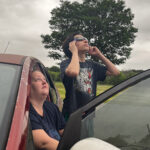
By Marisela Garcia
Viola Valadez, 54, was diagnosed with diabetes two years ago and is currently on insulin, something she always hoped to avoid.
Valadez is the second generation in her family to suffer from diabetes; her parents were diagnosed in their 70s. What frightens Valdez most is that she will never be able to get off insulin and live a healthy life.
But circumstances are changing for Valadez, one day at a time. Recently, while attending an exercise class at the Wesley Health and Wellness Center, she noticed a flier advertising a diabetes education class.
Valadez said she was hesitant prior to attending, unsure if others in the class would relate to her experiences. She was fearful, but her family supported her.
“I was feeling overwhelmed with having to come,” Valadez, a mother of three, said. “My daughter is the one who encouraged me to come.”
Committing to taking the diabetes education class, a disease which she knew little about when she was first diagnosed, was the first step in learning how to care for herself.
“It’s overwhelming. My whole lifestyle, my whole way of living has changed,” she said.
Education leads to self-management
On a recent summer afternoon, Valadez was the youngest enrolled in the WHWC’s diabetes education class. While waiting for the class to begin, women shared healthy substitutions for old family recipes.
The weekly meeting, led by WHWC’s health education program manager and certified diabetic educator Juan Martinez, educates those affected by the diabetes with the do’s and don’ts of living a healthier lifestyle.
Here’s how it works: Patients diagnosed with the disease at the WHWC are referred to the health education department where they can speak to a registered dietitian and registered nurses, all of whom are certified diabetic educators.
The center provides these same services to non-patients, like Valadez.
“Research has shown that by the time you’re diagnosed as a diabetic you’ve already been a diabetic for 5 to 10 years with micro vascular damage,” Martinez explained. “People need to make the necessary changes of eating healthier early in life to avoid this from happening.”
“It affects your community. It affects your family. It affects everyone, because it’s hereditary,” Martinez added.
Martinez educates people on how diabetes can be controlled. The classes can help alleviate pain in the future caused by the untreated disease; or in worse cases, the trouble of having to be on insulin.
One of the big lessons: Diabetes, which can be life-threatening, can be controlled and become less of a threat by merely exercising and consuming a proper, healthy diet.
That was a hard lesson for Valadez.
Having to continuously watch what she eats and making sure her she tates her medications on time turned her life upside down, Valadez said. And not understanding the specifics of each medication she had been prescribed had taken a toll on her physical and emotional well-being.
“It’s been an inconvenience,” Valadez said.
Initially, before coming to WHWC, she said she felt deprived of vital information. That was when she decided to attend the diabetes class, to learn more about the disease she said had taken over her world.
“Most people are unaware that they even have the disease, let alone be educated on it,” Martinez said. “The majority of the clients we see are diabetic.”
Martinez ended the class early to take time and have a one-on-one session with Valadez who said she felt left in the dark about her medications. Attending just one education class, Valadez said, was a life-changing experience. “It helped me out a lot; it was very educational.”
South Texas, ground zero for diabetes
- Adult diabetes is 20 percent higher in South Texas (Cameron, Hidalgo, Starr and Willacy counties) than the state of Texas.
- Released in 2011, a report by The Diabetes Care Project, estimates 11 percent of the adult population has adult diabetes in South Texas.
- The Diabetes Care Project also reported that there was a higher rate of uncontrolled diabetes in South Texas than in the United States overall in 2011.
Health experts at WHWC, located in the heart of the compact residential community of Columbia Heights in the South side of San Antonio, are in the business of helping reverse those trends.
Combating diabetes through outreach, investment
Constructed in 2008, the $12 million health and wellness center is owned and operated by Methodist Healthcare Ministries, a private, faith-based, not-for-profit organization formed in 1995. The center provides medical, dental and health-related human services to low-income families and the uninsured in South Texas.
MHM, the largest healthcare provider in San Antonio and 24 surrounding counties, provides the funding and resources so that the uninsured can benefit from free wellness and parenting programs, behavioral health services and nutrition and health education services.
Grants include ongoing support for agencies supporting addressing: access to care; dental and oral health; obesity and diabetes prevention; health education and promotion; mental and behavioral health services; public health policy and research; spirituality; and the health professional shortage.
The staff of the health program at the WHWC hope to enhance the health and well-being of families in their community. Among their many missions is a commitment to improving the quality of life for those who are unfamiliar with health issues.
The health education program sees an estimated 120 patients per month, including first-time patients such as Valadez. The program offers a broad education on how to live and address diabetes, advice and counseling on weight management, and fitness classes to teach families the importance of staying active.
During a recent health and education program staff meeting, Vanessa Enriquez, Registered Dietitian (RD) and CDE, explained her role in helping combat diabetes in San Antonio.
“I work with (patients) to build healthier eating habits,” she said.
Enriquez said she sees patients who range from young children to the elderly. But in order for her to see results from patients, she must first build a rapport.
“It’s a challenge,” Enriquez said. Changing one’s dietary patterns begins in the home and she works quickly to hep patients change their eating habits.
During the staff meeting, discussion centered on low-income people in San Antonio and struggles they face when trying to lead healthier lifestyles. Once a healthier diet is incorporated into a household, families tend to get physically more active said Certified Diabetic Instructor Lisa Rodriguez.
Martinez and his staff discussed the importance of exercise. City-wide partners are in agreement. With the help of the Mayor’s Fitness Council, the city hopes to “transform San Antonio into a healthier and more active community” by providing a list of free physical activities.
Statistics are also a hot topic among the center’s trained staff. Diabetes and obesity are bigger problems in the southern U.S., and especially more so here in San Antonio, Martinez said.
According to a recent report from The Office of Minority Health Hispanics have a higher rate of obesity compared to non-Hispanics. Also, they are twice as likely to be diagnosed with diabetes than a non-Hispanic. More and more people are at risk for obesity because they consume a vast amount of unhealthy fast food, Martinez explained. And those eating habits he added, put residents in South Texas at a greater risk of developing diabetes.
Lifestyle is another major factor.
“When you work late, you don’t have time to stop and cook,” Martinez said, describing increased rates of eating out, rather than preparing healthy meals at home.
Education, one day at a time
For Valadez, change is happening day by day.
“It was very helpful,” she said of the class. I was able to share the information with my family. They were very happy that I’m getting myself educated,” Valadez said.
She plans to continue educating herself on diabetes and attend a diabetes support group held later this year at WHWC. Since attending her first class, Valadez said her children have become more involved in helping her live a healthier life and, together, they are eating healthier.






